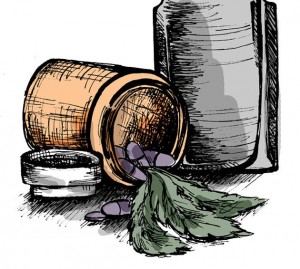Stimulants such as Adderall and Ritalin are controlled substances because of their addictive qualities. Side effects of these drugs include decreased appetite, dry mouth, increased heart rate and anxiety. For those who are predisposed to heart arrhythmia, stimulants can even cause sudden death—University Health Center Director Dr. James Guest
Daily Nebraskan, December 2, 2014 by Lani Hanson
In a National College Health Assessment last spring that surveyed more than 66,000 students from 140 institutions around the country, about 9 percent admitted to taking stimulants not prescribed within the past 12 months.
University Health Center Director Dr. James Guest said the most common of these stimulants are drugs that are used primarily to treat ADHD, such as Adderall or Ritalin.
Here’s what students should know about using stimulants to enhance their academic performance:
What do these substances do?
By stimulating the release of adrenaline, prescription drugs such as Adderall and Ritalin – when used by those without a prescription – enhance users’ concentration and make them more alert, Guest said.
“It’s the ‘fight’ part of the ‘fight or flight’ response,” he said. “So you’re more alert to your surroundings, and you concentrate more effectively.”
Why do students use these drugs?
“(Students) take them for an advantage that’s never been proven,” Guest said.
Students use these controlled substances because they believe it will help them study, but there have been no studies that show a correlation between using unprescribed stimulants and an increase in academic performance, he said.
What are the dangers of using these drugs?
Stimulants such as Adderall and Ritalin are controlled substances because of their addictive qualities, Guest said.
Side effects of these drugs include decreased appetite, dry mouth, increased heart rate and anxiety. For those who are predisposed to heart arrhythmia, stimulants can even cause sudden death, Guest said.
“Not frequently,” he added. “But it does happen.”
Possession without a prescription or selling controlled substances is also illegal on both the state and federal level.
Guest said using stimulants to improve academic performance is counter-productive. Using stimulants can affect sleep patterns and eating habits. Getting enough sleep is important for long-term memory, consolidating and remembering information.
How can students get help if they’re concerned about their own or a friend’s drug use?
“If an individual is taking (drugs) and is afraid that they may become addicted or is finding that they can’t stop buying them, they need to either come to the general clinic or CAPS,” Guest said. “We do have a drug and alcohol counselor that can help.“
As finals approach, what are healthy alternatives to aid in studying?
“Time management is the answer to many things,” Guest said.
The Jackie Gaughan Multicultural Center, First Year Experience and Transition Programs and Counseling and Psychological Services all offer programs to help students develop good study habits, he said.
One of the most important things Guest said students should remember is to get enough sleep. Pulling all-nighters can actually decrease academic performance.
Guest advised against skipping meals and reminded students to exercise.
“Let’s say you’re studying and you’re feeling overwhelmed, it’s good to step back and maybe go for a short jog or a brisk walk around campus, or take a 15-minute break and come back,” Guest said. “That helps you refocus.”
http://www.dailynebraskan.com/news/prescription-drugs-not-proven-to-enhance-academic-performance/article_43d82438-79c3-11e4-a79f-abbccbfcee4f.html



